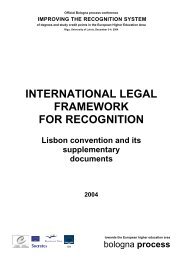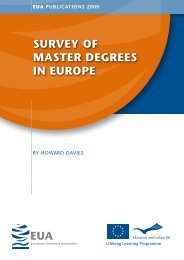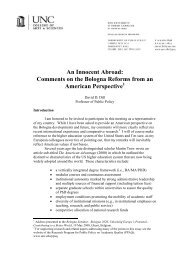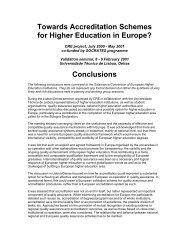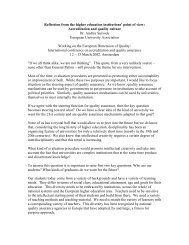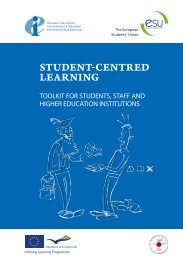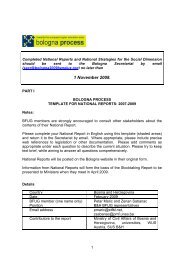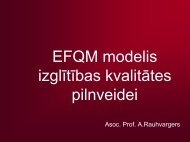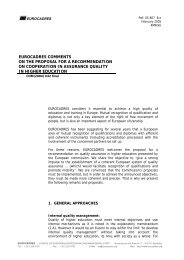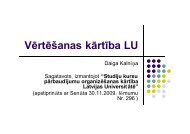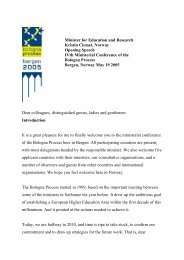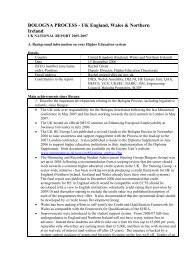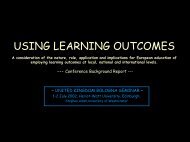BOLOGNA AND MEDICAL DEGREES – THE IMPORTANCE OF ...
BOLOGNA AND MEDICAL DEGREES – THE IMPORTANCE OF ...
BOLOGNA AND MEDICAL DEGREES – THE IMPORTANCE OF ...
Create successful ePaper yourself
Turn your PDF publications into a flip-book with our unique Google optimized e-Paper software.
Correspondence address:<br />
Hartmut Riehn, Manfred Gross, Jörg Pelz - Prodekanat für Studium und Lehre, Charitè; 10117 Berlin<br />
phone: +4930450576121; e-mail: joerg.pelz@charite.de; manfred.gross@charite.de; info@nc-klage.de(Hartmut Riehn)<br />
Germany’s Germany s Medicine on a legal<br />
way to Bologna:<br />
stony but manageable<br />
Hartmut Riehn 1,2 , Manfred Gross 2 , Jörg Pelz 2<br />
1 Vorsitzender Richter am VG a.D., Rechtsanwalt der Charité<br />
2 Prodekanat Studium und Lehre, Charité Universitätsmedizin Berlin, Germany<br />
Introduction<br />
Medical education is strongly regulated by different laws. The Treaty of Rome declares that member states<br />
are responsible for the specific conditions for taking up a profession within their national territory. Directive<br />
2005/36/EC of the European Parliament regulates the (minimal) standards of basic medical education<br />
for both duration and content. The German Ministry of Health is responsible for the Medical Licensure Act<br />
(ÄApprO) which regulates and specifies broadly content of teaching and assessment of student‘s qualifications<br />
necessary for receiving the license to practice medicine by the state. The basic framework of qualification<br />
of the Bologna-Process awarding a Bachelor‘s or a Master‘s degree is not regulated in any legal<br />
document relevant for medical education.<br />
Concept<br />
There is no imperative to establish the<br />
Bologna-Process in the medical curriculum<br />
for Germany’s faculties.<br />
-Medical faculties can make use of the<br />
‘model-clause’ (§ 41 ÄApprO) which<br />
provides them with a relative academic<br />
freedom, especially they get rid of the<br />
M1 exam.<br />
-Medical faculties organise the curriculum<br />
in modules; teaching is interdisciplinary<br />
covering basic sciences and clinical<br />
sciences right from the beginning.<br />
-To become licensed as a physician medical<br />
students have to pass the state<br />
exam after 6 years of studies – faculties<br />
embed at the end of 6 th and 10 th semester<br />
the possibility to acquire facultative a<br />
university degree, Bachelor and/or<br />
Master respectively.<br />
Strengths and<br />
Weaknesses<br />
Voluntary participation of students in the<br />
Bachelor or Master projects may lead to<br />
poor attendance, but students who find<br />
out that medicine is foreign to their<br />
nature can receive a degree, which<br />
opens perspectives for further studies or<br />
direct employment. This prevents su-<br />
perfluous educational activity and gua-<br />
rantees meaningful output.<br />
Students who enter the workforce at that<br />
point may not be properly prepared.<br />
Teaching without involvement of a signi- signi<br />
ficant amount of clinical issues right<br />
from the beginning leads to problems<br />
with the number of students which have<br />
to be enrolled.<br />
It may be easier to move from one<br />
country to another for further study.<br />
One possible way to Bologna for<br />
Germany’s Germany s medical faculties<br />
Conclusions<br />
The Legal Framework<br />
Treatiy of Rome<br />
Member states responsible for regulation of specific conditions<br />
for taking up a profession within national teritory<br />
Directive 2005/36/EC<br />
Medical education duration: duration:<br />
6 years, years,<br />
5500 hours and<br />
content: content:<br />
knowledge of the sciences on which medicin is based<br />
understanding structure, structure,<br />
function and behaviour of healthy and<br />
sick persons;<br />
adaequte knowledge of clinical disciplines and<br />
practices, practices,<br />
suitable clinical experience<br />
Medical Licensure Act (ÄApprO ApprO)<br />
Content – Assessment – Evaluation – State Examination - License<br />
No regulation of the implementation<br />
of the Bologna-Process<br />
Bologna Process in Medical Edudaton<br />
Auxiliary construction:<br />
construction<br />
Model-Curriculum<br />
Model Curriculum according to § 41 ÄApprO ApprO<br />
Relative freedom to implement a Bologna oriented curriculum<br />
6 th semester<br />
10<br />
Facultative university degrees Bachelor and Master<br />
semester provide an opportunity to receive Bachelor‘s Bachelor degree<br />
semester provide an opportunity to receive Master‘s Master degree<br />
10 th semester<br />
12th semester state exam – only possibility to be licensed as a physician<br />
Given the existing laws in Germany there is a way to<br />
implement the Bologna-Process Bologna Process in medical education. The<br />
current proposal is an auxiliary construction and should not<br />
become a permanent solution. If politicians mean business<br />
with the implementation of the Bologna-Process Bologna Process in medical<br />
education they have to start a new legislative process.<br />
It is possible to implement the Bologna-Process<br />
Bologna Process in the medical curriculum without<br />
changing the currently existing laws



